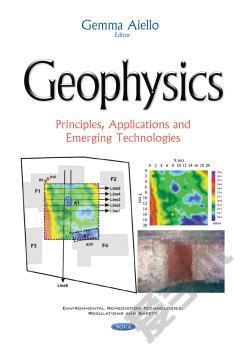Geophysics: Principles, Applications and Emerging Technologies
This book presents current research in the field of geophysics, particularly referring to some principles, applications and emerging technologies. Topics discussed comprehend environmental geophysics, with an explanation of geophysical methods (“seismic refraction and reflection techniques”, “seismic analysis of surface waves”, “electrical methods”, “gravimetric and microgravimetric methods”, “magnetic and electromagnetic methods”) and new methodologies of processing and interpretation with examples in the area of Greece; applications of innovative geophysical techniques in other coastal areas, showing a new approach to seismic data acquisition, joining up land and marine seismic data through a marine streamer connected to a land cable with examples in Procida and Ventotene islands (Southern Italy); marine geophysics of Naples Bay focusing on seismic and magnetic data offshore the Vesuvius, Phlegrean Fields, Ischia and Procida volcanic complexes and a technological evolution in seismic data acquisition from explosive, Sparker and Watergun seismic sources towards new techniques, including MEAS (Multispot Extended Array Sparker) used in marine geological mapping of Southern Italy’s continental shelf and slope. Other topics in this book include oceanographic aspects regarding the oceanic oscillation phenomena and their relationships with the synchronization and stochastic resonance, particularly referring to the transitions among stable and unstable states of western boundary currents, such as the Kuroshio in Japan and investigating their occurrence in general oceanographic circulation as a rhythmic natural phenomena; oceanographic aspects regarding the assessment of ocean variability in the Sicily Channel (Southern Italy) through a numerical 3D model based on Empirical Orthogonal Functions (EOF) analysis aimed at studying the seasonal and interannual variability of oceanographic circulation and hydrology, and extending down to the African coast, involving the Tunisian and Lybian continental shelves (Mediterranean sea); and finally, experimental application of distributed optical fiber sensors through Brillouin Optical Time Domain Analysis (BOTDA) to the monitoring of artificially induced cracks opening in the volcanic rocky slope of the Coroglio coastal cliff (Naples, Southern Italy) aimed at the development of early warning systems and geomorphological setting of coastal cliffs, characterized by a rocks falls, topples and slides.
{{comment.content}}








 京公网安备 11010802027623号
京公网安备 11010802027623号